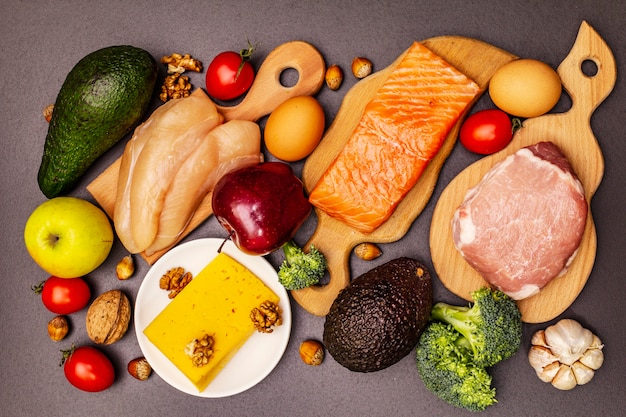What foods contain healthy fats ?
Perhaps we have always believed that the best way to lose weight is to eliminate any fat from our daily diet; So, as the first step in the direction of health and reaching an ideal weight, we used to deprive ourselves of eating those foods that we think are so-called fatty.
But how would you react if you knew that crossing all these fats from our diet plans could end up being detrimental to us? What if you know that useful fat is a scientifically defined concept in diets and their existence is even obligatory and necessary?
Leaving the safe area!
Think about the word fat for a few seconds; What other words come to your mind after fat? Overweight, calories, disease, clogged arteries, breaking the diet, fast food, unhealthy life and probably thousands of other words that quickly come to mind, with fat at the top. But after reading this text, you will definitely put other words in this queue!
Contrary to past dietary recommendations that promoted low-fat diets, newer research shows that a group of fats are essential and beneficial to health. So it is on this basis that the term useful fat is defined.
When food manufacturers cut back on fat, they often replace it with sugary carbohydrates, refined grains, or other starches. But what is our body’s reaction when faced with these substances?
The human body is designed to digest these refined carbohydrates and starches very quickly. Therefore, it affects blood sugar and insulin levels, and this process will probably lead to weight gain and diseases in the future. What foods should not be eaten by a seven-month-old baby
However, findings from the Nurses’ Health Study and the Health Professionals Follow-up Study show that there is no relationship between the total percentage of calories from fat consumed (not necessarily healthy fat or Harmful), and there are no consequences for human health, including cancer, heart disease or weight gain.
What to do to have a healthy diet?
You have probably come to the conclusion up to this part of the text that instead of advocating low-fat and sometimes even fat-free diets! You have to balance this and get to know useful fat and include it in your food; Because fat is an important part of a healthy life!
So, you should choose foods with unsaturated fats, or in other words, foods that contain good and healthy fats. Then limit the consumption of foods containing high saturated fat and avoid the use of trans fat, which is considered the most harmful type of fat.
step one; Identifying useful and harmful fats
“Good” unsaturated fats: monounsaturated and polyunsaturated fats – reduce the risk of disease. Useful fats reduce cholesterol levels and even improve brain and heart performance. Foods rich in good fats include vegetable oils (such as olive, canola, sunflower, soybean, and corn), nuts, seeds, and fish.
“Bad” fats: so-called trans fats, make you more susceptible to disease. Even when you consume these fats in small amounts. Trans fats are hydrogenated and turned into oil, and fortunately, they have been removed from many foods today. These fats increase bad cholesterol and blood pressure and therefore increase the risk of cancer, heart disease and diabetes.
Beef, butter, oils used in preparing fast foods and processed foods such as cakes and biscuits are included in this category of fats. Obesity diet
Saturated fats, although not as harmful as trans fats, have a negative effect on health compared to unsaturated fats and are best consumed in moderation. Foods high in saturated fat include red meat, poultry, and dairy products. Some vegetable fats such as coconut oil and palm oil are also rich in saturated fat.
As you cut back on foods like red meat and butter for a healthy, healthy fat diet, ditch the refined carbs and replace them with fish, beans, nuts, and healthy oils.
Healthy and unhealthy fats, a little deeper
Looking deeper, monounsaturated fatty acids (MUFA) and polyunsaturated fatty acids (PUFA) are healthy fats that can:
bring heart health with them,
reduce the level of bad blood cholesterol (LDL),
and improve blood glucose levels.
The two PUFAs or polyunsaturated fatty acids that are more famous and considered to be the most important sources of healthy fats are omega-3 and omega-6 fatty acids. The human body is not able to make these types of fatty acids, and for this reason, they should not be removed from your diet. In fact, you should follow a diet that fully meets the body’s need for these substances.
As a proven rule of thumb, healthy fats like olive oil are liquid at room temperature. In contrast, most saturated fats and trans fats are unhealthy fats. Foods rich in these substances are often solid at room temperature.
The strange and remarkable thing about the consumption of unhealthy fats is that even a 2% increase in the use of trans fats on a daily basis increases the risk of cardiovascular diseases by 23%!
Complete removal of fat, the beginning of successive problems!
As you have noticed up to this part of the text, fats are not so scary and probably the next time you hear the name of fat, more interesting concepts will come to your mind. In order to put more emphasis on the benefits of fat and show the importance of its presence in the diet as boldly as it is, we must first examine the effects that removing fat has on the body.
The end of the weight loss process, even before it begins!
One of the most important consequences of fat removal is failure in the weight loss process. Therefore, fat removal cannot be considered the main key to losing weight and achieving an ideal body. Because if you don’t consume fat, especially healthy fat, you will feel more hungry!
The truth is, if you don’t get enough of certain nutrients, you’ll end up looking to get the same amount of calories from another source. If the body does not get the amount it needs from fat, it forces us to compensate for its deficiency by increasing the consumption of refined carbohydrates.
According to a study conducted by the American Journal of Clinical Nutrition, the consumption of healthy fats slows down the absorption of food. Therefore, it helps us feel full for a longer period of time and thus prevents us from overeating. In addition, the consumption of omega-3, which is an important source of useful fat, has a high effect on reducing abdominal fat.



